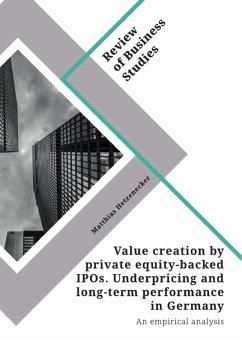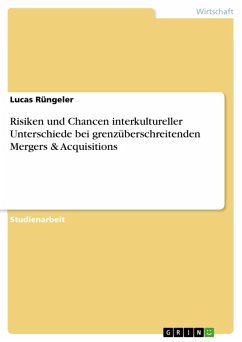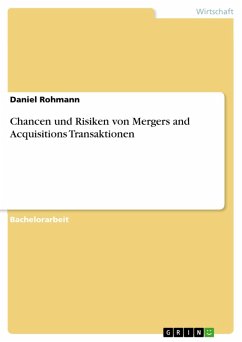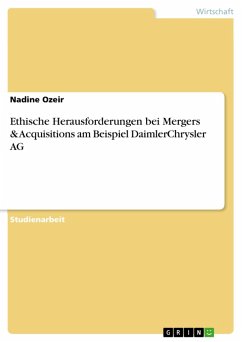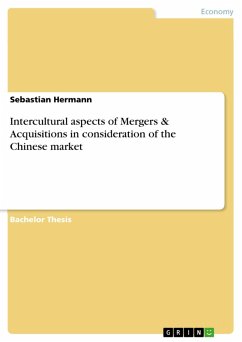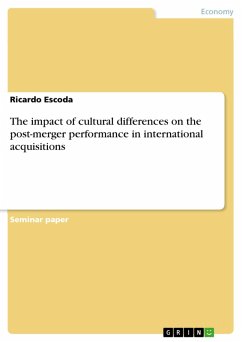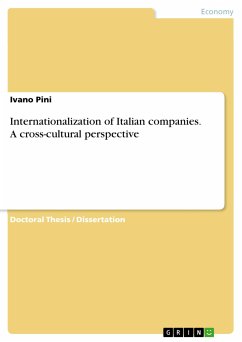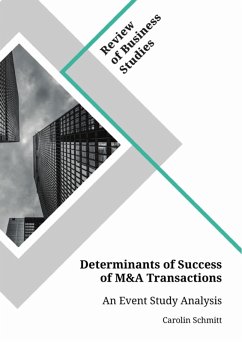
Determinants of Success of M&A Transactions (eBook, PDF)
An Event Study Analysis Examining Determinants of Success of M&A Transactions of DAX Companies
Sofort per Download lieferbar
Statt: 27,95 €**
18,99 €
inkl. MwSt. und vom Verlag festgesetzt.
**Preis der gedruckten Ausgabe (Broschiertes Buch)
Alle Infos zum eBook verschenkenWeitere Ausgaben:

PAYBACK Punkte
0 °P sammeln!
Bachelor Thesis from the year 2019 in the subject Business economics - Review of Business Studies, grade: 1.0, Otto Beisheim School of Management Vallendar, language: English, abstract: In times of globalization and new emerging markets, companies face escalated pressure to continually adapt to changing environments and to develop appropriate strategy adjustments to stay competitive. To improve performance by expansion, companies engage in mergers and acquisitions (M&A). Volumes (number of deals) and values (price of deals) of M&A have quintupled to a value of almost 4 trillion U.S. dollars (2...
Bachelor Thesis from the year 2019 in the subject Business economics - Review of Business Studies, grade: 1.0, Otto Beisheim School of Management Vallendar, language: English, abstract: In times of globalization and new emerging markets, companies face escalated pressure to continually adapt to changing environments and to develop appropriate strategy adjustments to stay competitive. To improve performance by expansion, companies engage in mergers and acquisitions (M&A). Volumes (number of deals) and values (price of deals) of M&A have quintupled to a value of almost 4 trillion U.S. dollars (2018) in the last 30 years. This development reflects the growing strategic relevance of those transactions for managers. Even though M&A are among the most powerful tools for managers to create shareholder value and can substantially upgrade a company's performance, they are also one of the most failure-intensive activities due to global economic uncertainty, the possibility of cultural clashes and managerial self-interest. Consequently, it is essential for shareholders as well as for managers to understand the critical drivers for a successful M&A deal. In existing research, there is sufficient evidence that M&A benefit the target firms economically whereas the performance impact for acquirers is ambiguous. Moreover, most studies examine M&A activities in the United States or the United Kingdom while Germany is widely neglected despite its global economic relevance. This study aims to fill this research gap. No previous study explores the effect of DAX 30 M&A activities; nor does any study assess the same combination of influencing factors for a deal's success. Resultingly, this paper contributes to the existing literature by identifying drivers for acquirers' short-term M&A success. Focusing on German companies, it clarifies which factors shareholders use to evaluate M&A transactions. Thereby, it helps managers to determine which deals are more promising than others.
Dieser Download kann aus rechtlichen Gründen nur mit Rechnungsadresse in A, B, BG, CY, CZ, D, DK, EW, E, FIN, F, GR, HR, H, IRL, I, LT, L, LR, M, NL, PL, P, R, S, SLO, SK ausgeliefert werden.





